
Top Tools for Refining Thesis Statements
A strong thesis statement is essential for academic writing - it keeps your paper focused and clear. To refine your thesis effectively, tools like AI writing assistants, text enhancers, and plagiarism checkers can make the process faster and easier. Here's a quick breakdown of what to look for and the top tools available:
- AI-Powered Assistance: Tools like Yomu AI and Grammarly provide suggestions to improve clarity, coherence, and focus.
- Text Enhancement: Features like paraphrasing and summarization help refine your language while maintaining academic tone.
- Plagiarism Detection: Ensure originality with advanced plagiarism checkers that scan extensive databases.
- Citation Management: Tools like Yomu AI integrate citation formatting to save time and reduce errors.
Quick Comparison
| Tool | AI Assistance | Text Enhancement | Plagiarism Checking | Citation Management | Academic Focus | Monthly Pricing |
|---|---|---|---|---|---|---|
| Yomu AI | Advanced feedback engine | Paraphrasing, summarization | Built-in | Integrated (Sourcely) | High | $19/month |
| Grammarly | Real-time grammar checks | Tone adjustment | Not included | Limited | Medium | $12/month |
| QuillBot | Thesis statement generator | Paraphrasing, summarization | Available (premium) | Separate feature | Medium | $9.95/month |
Choose a tool based on your academic needs, workflow compatibility, and budget. Yomu AI is ideal for all-in-one academic writing, while Grammarly and QuillBot focus on language refinement and thesis generation.
AI Tools for Enhanced Thesis Writing
What to Look for in Thesis Refinement Tools
When selecting a thesis refinement tool, it's important to look for features that do more than just correct grammar and spelling. The right tool should enhance your academic writing while maintaining the originality and rigor that U.S. universities demand. Here's what sets advanced thesis refinement tools apart from basic writing software.
AI-Powered Assistance
AI technology has transformed the way theses are written, cutting drafting time by as much as 40%. These tools provide context-aware suggestions that improve clarity, coherence, and focus, while smart prompts can help you overcome writer's block. The most effective AI-powered features analyze your thesis statement, offering insights on clarity, relevance, and coherence. They can help you spot weak arguments, recommend more precise wording, and identify areas where your thesis might lack focus.
Interestingly, graduate students spend 35% more time on critical analysis, resulting in stronger, more compelling arguments.
"AI-powered writing assistants serve as indispensable partners in the dissertation writing journey, offering invaluable guidance in refining grammar, style, and coherence. By detecting errors, offering alternative wordings, and ensuring overall clarity, these tools empower students to craft polished and compelling academic works that resonate with scholarly rigor and precision." - Doreen Kanario, Academic Writing Expert
While these tools can be incredibly helpful, remember that the final decisions and nuanced adjustments are always up to you, the researcher. The best tools are designed to complement your thought process, not replace it.
Building on these AI-driven features, advanced tools also offer robust text enhancement capabilities.
Text Enhancement Features
Top-tier tools go beyond simple grammar checks, offering advanced text enhancement features that elevate the quality of your writing. These tools not only detect grammatical errors but also provide paraphrasing and summarization options tailored to academic standards.
Paraphrasing tools are especially useful for expressing complex ideas more clearly while keeping the original meaning intact. Choose tools that suggest alternative phrasings aligned with academic conventions, helping to refine the sophistication of your language.
Summarization features are another key asset. They allow you to condense extensive research into concise thesis statements or summaries. The best tools can process large amounts of research material and highlight the core arguments that should shape your thesis.
AI-driven readability analysis can improve clarity by 30% and enhance the use of field-specific terminology by 25%. Additionally, consistency tracking ensures your tone and style remain aligned throughout the document.
"Clear writing supports clear thinking, and academic readers will expect a level of consistency and professionalism in tone and style throughout the thesis."
Academic Integrity Tools
Maintaining academic integrity is essential, and the best thesis refinement tools include features to help you uphold it. Plagiarism detection is a must-have, as it helps ensure your work remains original and adheres to academic standards. Plagiarism not only undermines your research but can also lead to severe consequences, including reputational harm and academic penalties.
Look for tools with advanced plagiarism detection that scan extensive databases, including academic journals, student papers, and web content, achieving up to 98% accuracy. These tools should provide detailed reports that highlight potential issues, giving you the chance to address them before submission. Keep in mind that a high similarity score doesn't always indicate plagiarism - it might reflect legitimate use of common academic phrasing.
Citation management is another critical feature. Effective tools help you properly format citations in styles like APA, MLA, or Chicago and identify missing citations, preventing unintentional plagiarism. Some tools even offer structured feedback systems, such as downloadable revision reports, to ensure you address all areas of concern.
Additionally, features like evidence integration analysis can help you identify sections of your thesis that rely too heavily on assumptions instead of properly cited sources. This ensures your work accurately reflects the depth and scope of your research.
Professional-grade tools stand out by offering reliable plagiarism detection, extensive database access, and strong data protection policies. These features not only refine your writing but also safeguard the integrity of your academic work.
Best Tools for Refining Thesis Statements
Finding the right tools can make a big difference when it comes to sharpening your thesis statement. Below, we’ve highlighted some of the best options, each offering features tailored to different aspects of academic writing.
Yomu AI
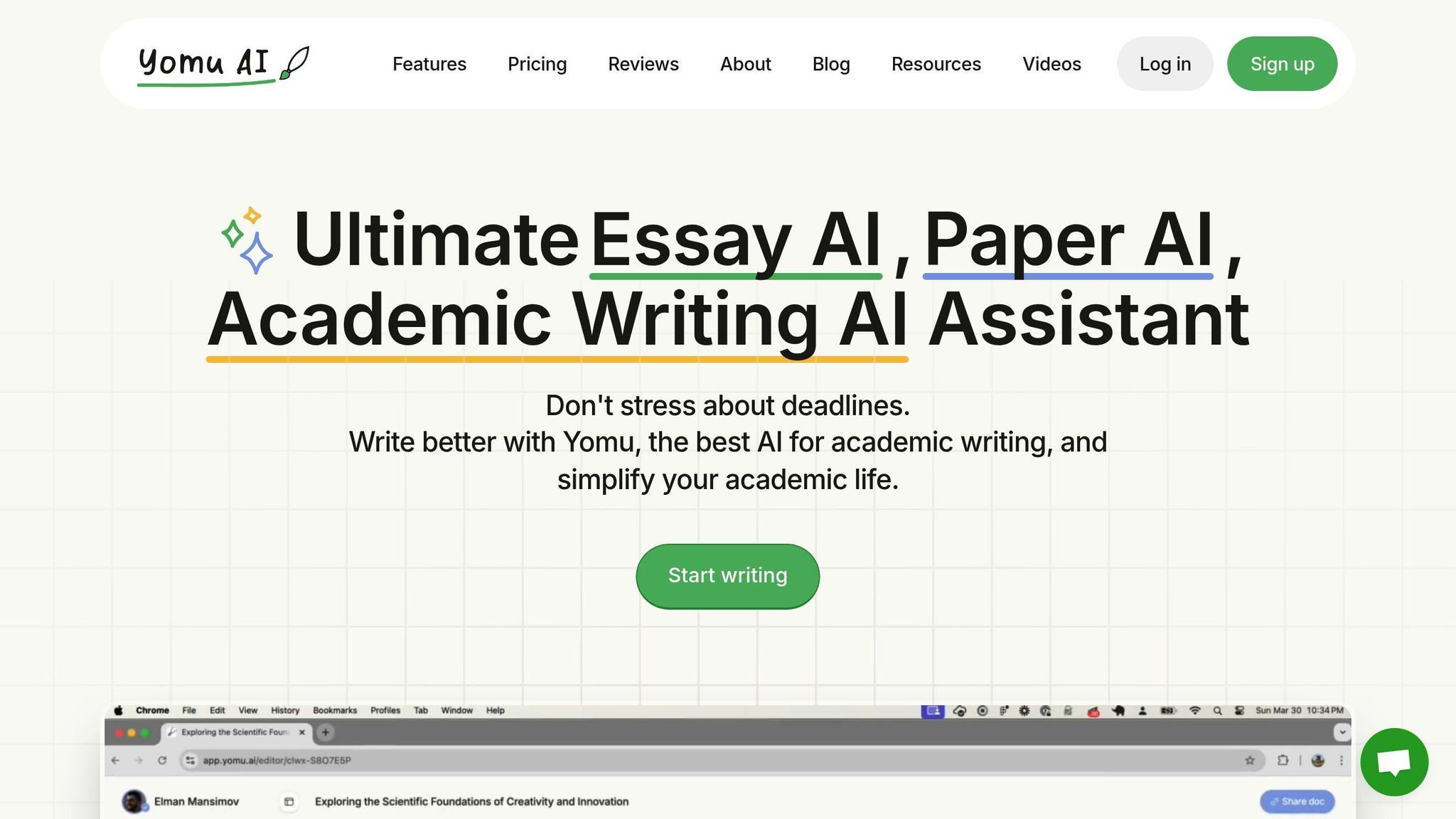
Yomu AI is an all-in-one academic writing platform that simplifies the entire writing process. Its powerful AI tools handle everything from drafting and feedback to citations, formatting, and plagiarism checks - all in one place.
One standout feature is its Feedback Engine, which fine-tunes your thesis for clarity, logical flow, and academic tone. Unlike basic grammar tools, Yomu AI provides actionable suggestions that improve the structure and precision of your argument.
For citations, Yomu AI integrates with Sourcely, letting you insert properly formatted references directly into your document without leaving the platform. Its plagiarism checker goes a step further by flagging specific sentences for review, helping you maintain academic integrity. The platform also supports advanced formatting tools for headings, tables, equations, and images, and allows seamless exporting to PDF, Word, or LaTeX.
In a May 2025 trial, Yomu AI demonstrated its ability to support users through the entire workflow - from forming a research question to producing a submission-ready paper.
Pricing:
- Starter Plan: $9 (one-time fee)
- Pro Plan: $19/month (billed annually)
- Ultra Plan: $29/month (billed annually)
Grammarly
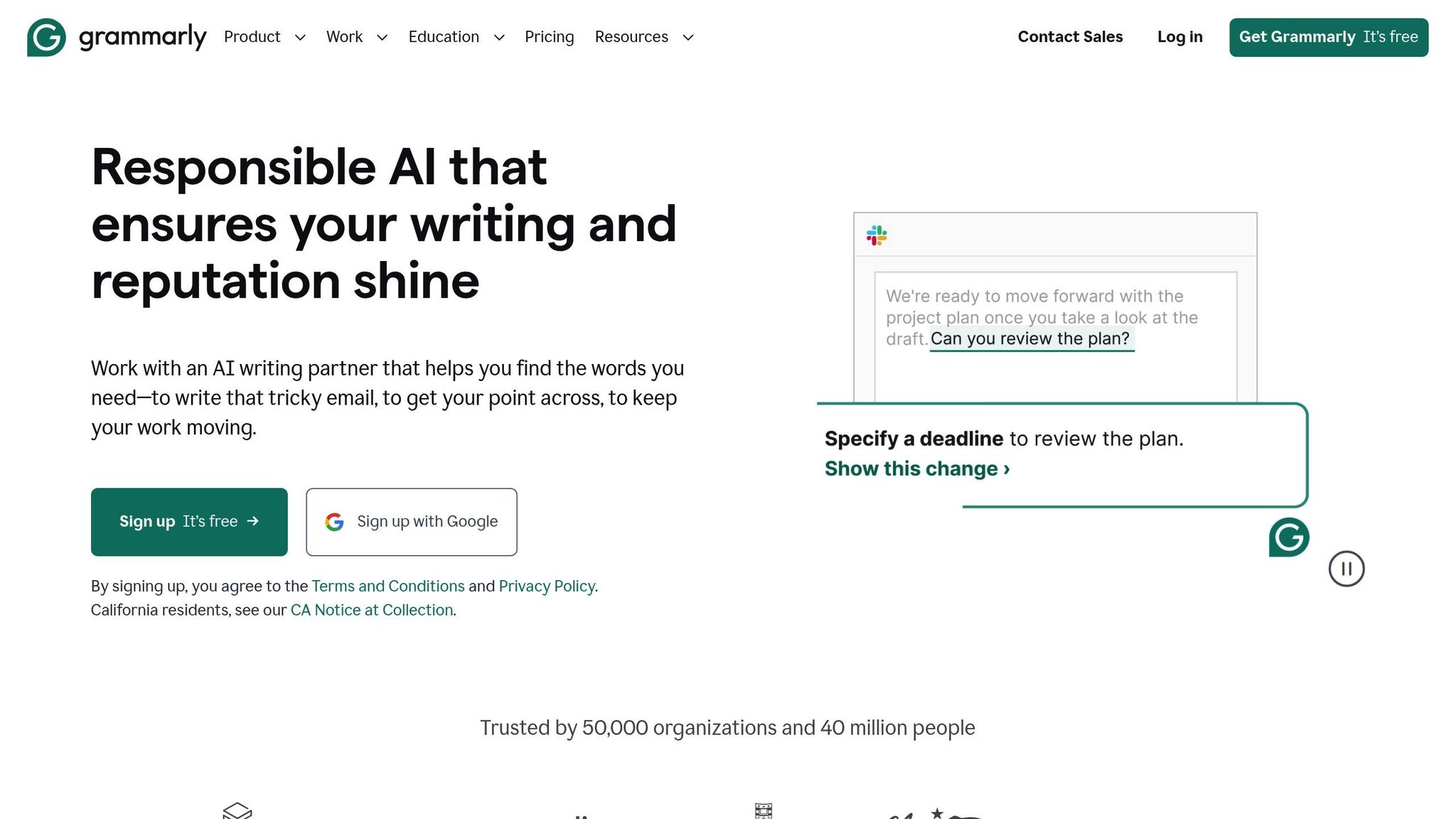
Grammarly is a household name for real-time grammar and style checks, but it also offers tools for academic writing. Its thesis statement generator is particularly helpful for improving clarity and adjusting tone to meet academic standards.
Grammarly excels at catching grammatical errors, awkward phrasing, and tone inconsistencies that can weaken your thesis. It integrates easily with popular writing platforms, providing feedback as you type. However, its focus is more on language and style rather than the deeper structural elements of thesis development.
Smodin
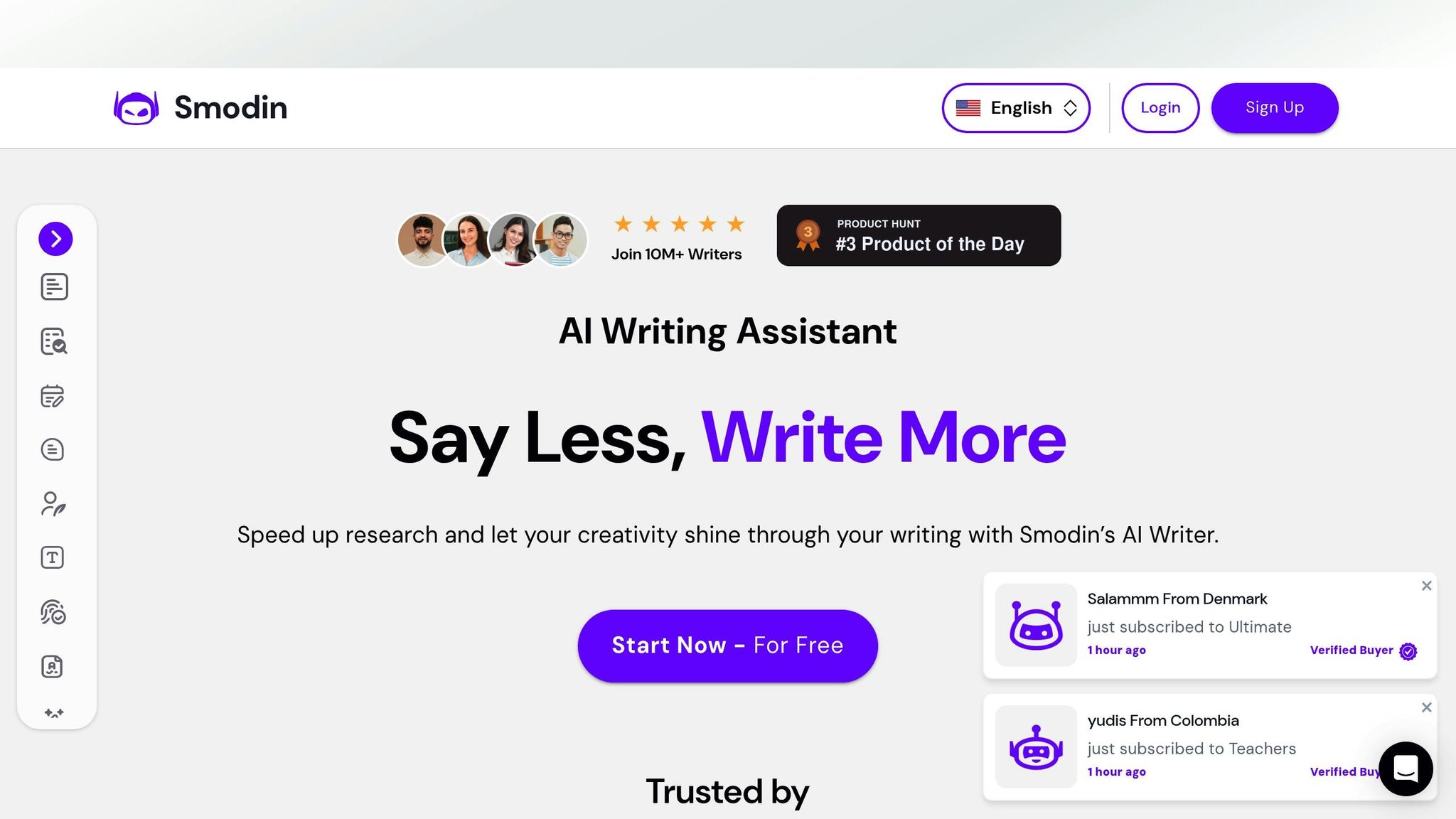
Smodin takes a template-driven approach to thesis statement creation, making it a great option for brainstorming or exploring different research angles. With support for over 100 languages, it’s especially useful for international students or researchers who work in multilingual settings.
The platform generates thesis statements quickly using templates that adhere to standard academic structures. You can further tweak and customize these statements using Smodin’s editing features, giving you a strong foundation for developing your argument.
QuillBot Thesis Statement Generator
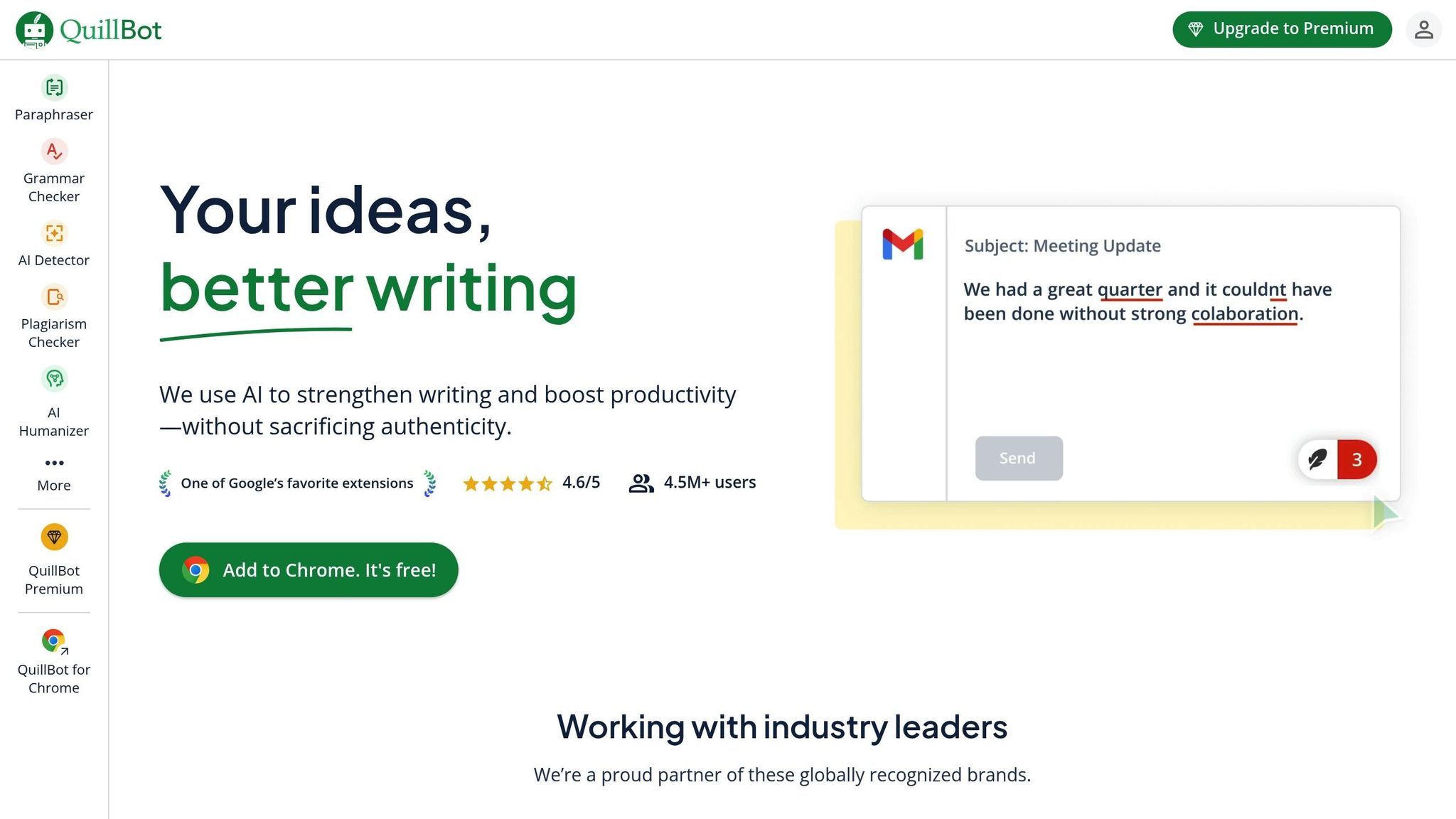
QuillBot uses AI to create thesis statements that are both specific and debatable - two essential qualities for strong academic arguments. It also provides tools for paraphrasing and summarizing, ensuring your thesis is clear and concise.
This tool is ideal for crafting statements that capture the essence of your research while maintaining precision and focus. Its ability to refine language makes it a reliable choice for developing well-argued thesis statements.
Consensus
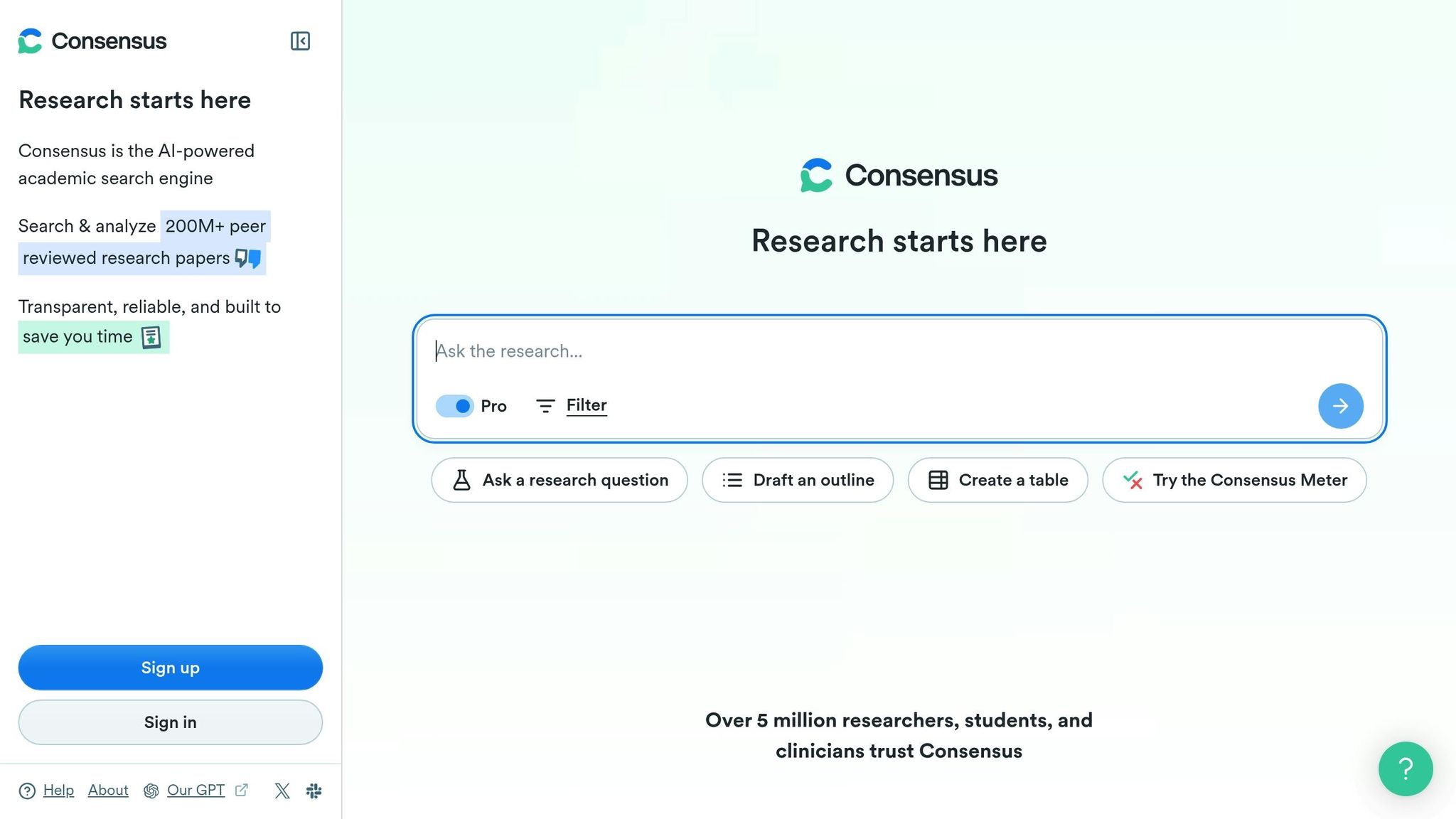
Consensus stands out by synthesizing research findings and summarizing academic evidence to help you refine your thesis. Instead of simply generating a thesis statement, it positions your argument within the broader academic conversation.
By analyzing multiple sources, Consensus identifies gaps in existing research and highlights key findings. This makes it particularly useful for grounding your thesis in scholarly evidence and ensuring it contributes meaningfully to your field of study.
Each of these tools offers something unique, whether you're looking for language refinement, structural guidance, or evidence-based argumentation. The key is to match the tool to your specific needs and academic goals.
sbb-itb-1831901
Feature Comparison of Top Tools
Here’s a breakdown of key features for some of the leading thesis refinement tools:
| Tool | AI-Powered Assistance | Text Enhancement | Citation Management | Plagiarism Checking | Academic Focus | Monthly Pricing |
|---|---|---|---|---|---|---|
| Yomu AI | Advanced feedback engine evaluates clarity, coherence, and academic tone; includes autocomplete and outline suggestions | Paraphrasing, summarization, and tone adjustment | Integrated citation support powered by Sourcely for instant formatting | Built-in plagiarism detection with detailed similarity reports | High – tailored for academic writing | $19/month |
| Grammarly | Real-time grammar and style checks | Clarity improvements and tone adjustment | Limited citation support | Not included | Medium – recently added academic mode | $12/month |
| QuillBot | AI assistance includes thesis statement generation | Strong paraphrasing with seven modes and summarization | Citation generator available as a separate feature | Plagiarism checking available in premium | Medium | $9.95/month |
The table highlights key metrics, but let’s dive deeper into what each tool offers.
AI-Powered Assistance sets these tools apart. Yomu AI stands out with its ability to assess clarity, coherence, and academic tone while offering actionable suggestions for improvement. Grammarly focuses on real-time corrections for grammar and style, while QuillBot provides tools for generating thesis statements and improving clarity.
When it comes to Text Enhancement Features, QuillBot shines with its seven paraphrasing modes, offering flexibility to match different writing needs, though its output might require slight adjustments for natural flow. Yomu AI, on the other hand, takes a more comprehensive approach, combining paraphrasing, summarization, and academic tone refinement in one platform.
Citation Management is another area where Yomu AI excels. Its integration with Sourcely ensures seamless and accurate citation formatting, alongside built-in plagiarism detection for maintaining academic integrity. QuillBot offers a citation generator, but it’s a separate feature, while Grammarly provides only limited citation support.
The User Experience varies as well. Yomu AI offers a unified interface that combines drafting, editing, citation management, and formatting, with options to export to PDF, Word, or LaTeX. Grammarly integrates smoothly with tools like Google Docs but may require switching between apps for full functionality.
The academic focus of each tool is an important consideration. Yomu AI is specifically designed for academic writing, with features like academic tone adjustment and integrated citation tools. Grammarly and QuillBot, while effective for general writing tasks, lean more toward language mechanics and lack the specialized features offered by Yomu AI.
Finally, Pricing can influence your choice. Yomu AI’s Pro plan costs $19/month, offering unlimited AI actions and access to multiple models. QuillBot is more budget-friendly at $9.95/month, while Grammarly’s premium plan is priced at $12/month.
These differences can help you determine which tool aligns best with your academic writing needs.
How to Choose the Right Tool for Your Needs
Picking the right thesis refinement tool can make a big difference in both sharpening your writing mechanics and crafting a strong, argumentative thesis.
Let Your Academic Goals Guide You
A solid thesis statement should be clear, focused, and debatable - something that invites discussion or even disagreement. Look for a tool that helps you create a thesis that’s "precise, focused, and contestable; it should predict the sub-theses or blocks of information that you will use to prove your argument". A good tool should also help you define the scope of your argument, connect evidence effectively, and ensure your thesis aligns with your assignment’s requirements. And don’t forget to think about how the tool meshes with your current writing process.
Seamless Workflow Integration
Your productivity depends heavily on how well a tool fits into your workflow. Research suggests that even if a tool helps you produce better work, a frustrating user experience can reduce the quality of your output over time. Start by pinpointing any pain points in your current process - like juggling multiple apps for citations, plagiarism checks, and text improvements. Tools like Yomu AI address this by offering an all-in-one solution, eliminating the need to switch between platforms.
Balancing Budget and Features
Cost is another critical factor. Tools often vary in price based on their features and target audience. A 2020 Pearson survey revealed that 33% of students struggled with identifying writing errors and lacked adequate support. This highlights the importance of choosing a tool that provides comprehensive help, not just surface-level corrections. When evaluating price, think about the long-term value. A single, reliable tool might save you from the hassle of constantly switching between multiple platforms.
Try Before You Buy
Free trials are your best friend when it comes to testing a tool’s fit for your needs. The right tool should streamline your writing process, make it more enjoyable, and reduce unnecessary hurdles - not add to them.
FAQs
How can AI tools improve the clarity and focus of my thesis statement?
AI tools can help sharpen your thesis statement by giving precise feedback on its structure, tone, and the strength of your argument. They assess your writing to suggest improvements, like rephrasing for smoother readability and a more logical flow, ensuring your main idea is communicated clearly.
These tools also spot inconsistencies or unclear wording and offer paraphrasing options to make your thesis more concise and easy to follow. With features like real-time suggestions and text refinement, AI-powered platforms streamline the process of perfecting your thesis statement.
What are the advantages of using an all-in-one academic writing platform like Yomu AI instead of separate tools for different tasks?
Using a platform like Yomu AI streamlines the academic writing process by combining all the necessary tools into one convenient hub. This setup helps you work faster, stay focused, and keep your writing style consistent from start to finish.
Yomu AI offers features such as smart text enhancement, citation formatting, and an advanced plagiarism checker. These tools remove the hassle of jumping between different apps, saving you time and minimizing the chance of mistakes or mismatched formatting. It’s designed to simplify academic writing and make the process smoother and more efficient.
How can plagiarism detection tools help ensure my thesis is original and maintains academic integrity?
Plagiarism detection tools are essential for ensuring the originality of your thesis. They work by comparing your work against extensive databases and private repositories to spot any matching or potentially copied content. This process helps ensure your research remains genuine and avoids unintentional duplication.
With these tools, you can confidently refine your thesis, knowing it adheres to academic integrity and maintains high standards of originality.
